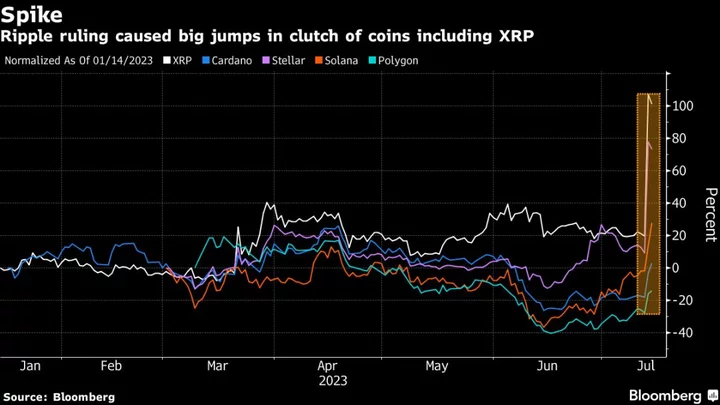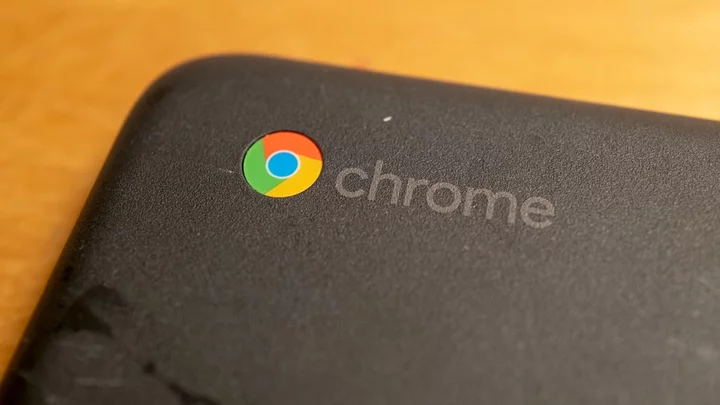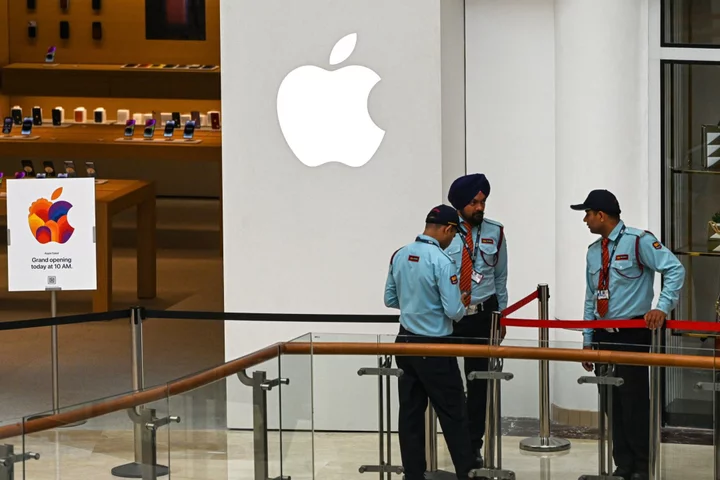A US Securities and Exchange Commission lawsuit against Ripple Labs Inc. has kept crypto on edge since 2020 by raising the prospect that digital tokens are securities that fall under the agency’s strict regulatory purview. Yet even as a ruling Thursday seemed to undermine the watchdog’s case, the issue is far from settled.
The judge in the proceedings ruled that the XRP token linked to Ripple was a security when sold directly to institutions but not when offered to the public on exchanges. The industry rejoiced in the implication of potential limits to the SEC’s power to extend a crackdown on a sector it argues is replete with risky practices.
XRP and a range of smaller tokens — so-called altcoins — surged on bets that a regulatory overhang is receding and opening the way to more demand. The industry also views the court decision as a challenge for the SEC’s other cases, such as a June lawsuit targeting the largest US digital-asset exchange Coinbase Global Inc. for allegedly offering unregistered securities.
While the case is a blow to the SEC, it’s first and foremost about San Francisco-based Ripple. The SEC accused the company, co-founder Christian Larsen and Chief Executive Officer Bradley Garlinghouse of misleading investors in XRP by selling more than $1 billion worth of the tokens without registering them.
US District Judge Analisa Torres in New York opined that $729 million worth of XRP was indeed a security when sold to institutional investors, but that the chunk bought by retail investors on exchanges didn’t meet the Howey test for an investment contract under federal law.
Howey Test
Under Howey, an investment contract — which would be considered a security — exists if there’s an “investment of money in a common enterprise with a reasonable expectation of profits to be derived from the efforts of others.”
The rationale for the duality in the Ripple ruling is that in many instances retail buyers had no idea where their money was going or what it was being used for, in contrast to sophisticated institutions. One big question is whether that logic will survive possible appeals or gain ground in other legal battles.
“We have to remember that this is just one judge’s application of the facts and circumstances to the applicable law, not precedent for other cases in which the facts and circumstances may be different, and where the judge may have a different interpretation of the law,” said Richard Levin, chair of the fintech and regulation practice at Nelson Mullins.
There are also complexities in Torres’s ruling. A footnote in the judgment says the ruling doesn’t address whether secondary sales of XRP constitute investment contracts — and the status of such secondary-market sales is at the heart of the SEC’s case against Coinbase, a suit the company says lacks merit.
Read more: Did Ripple Win or Lose in Court Today? Yes: Bloomberg Crypto
“Courts generally only explicitly address the issues presented by the parties and the parties here didn’t address secondary market sales because the SEC didn’t charge those,” said Bloomberg Intelligence’s Senior Litigation Analyst Elliott Stein. But he added that the court’s logic likely applies even more strongly to purchases undertaken by the public via digital-asset exchanges.
Investor Protection
One concern is that the Ripple ruling threatens to strip retail crypto investors — who typically buy and sell tokens on exchanges — of the extra protection that comes with the securities tag and SEC oversight.
The XRP judgment is “counterintuitive,” said Hilary Allen, a law professor at American University Washington College of Law. “If we think about why the securities laws exist, the primary purpose is to protect retail investors. To offer protections to institutional investors and deny them to retail investors — to me that seems inconsistent to the purposes of the securities laws.”
For example, SEC chair Gary Gensler has warned that crypto companies frequently combine activities — such as custody and exchange services — that are normally performed by separate regulated entities, imperiling investors.
“This ruling could make it harder for the SEC to protect retail investors from purveyors of cryptocurrency-related products and services, possibly including cryptocurrency exchanges,” said Eswar Prasad, a professor of trade policy at Cornell University.
The SEC brought 24 crypto-related enforcement cases between January and early June alone, according to Cornerstone Research, including against exchanges Binance, Coinbase, Kraken and Gemini.
The ongoing legal uncertainty around tokens may also change how institutional investors such as venture capitalists fund crypto projects. While in the past venture firms often got tokens of a project in exchange for funding, now they may be even more likely to snap up equity, said Robert Le, a crypto analyst at data firm PitchBook.
Relisting XRP
In its lawsuits, the agency has also deemed a range of digital assets to be unregistered securities, prompting exchanges to delist some of the tokens. In the wake of the Ripple judgment, platforms including Coinbase, Kraken, Crypto.com, Bitstamp and BitGo said they would make XRP available to US investors, while Gemini tweeted that it would explore the step.
The industry says the SEC has overstepped its authority, and many US crypto businesses have begun moving or expanding overseas, worried that local business would largely be limited to Bitcoin, which regulators currently view as a commodity.
The legal process for Ripple is still playing out, with the SEC likely to appeal and the final decision potentially months away, according legal experts. The case against Ripple will still proceed on the institutional-sales claims, though any trial may be delayed by the expected appeals.
The SEC is reviewing the ruling, and spokesperson Scott Schneider said the agency is “pleased that the court found that XRP tokens were offered and sold by Ripple as investment contracts in violation of the securities laws.”
Allen from American University Washington College of Law said the ruling by Torres is “a precedent, but it’s a precedent with caveats.”
“It’s a setback to the SEC, but I don’t think it’s a deathblow,” Allen said. “This is the first case the SEC hasn’t won on crypto as far as I am aware. But I don’t think you can say this one judge has torpedoed the SEC’s enforcement strategy.”
--With assistance from Sidhartha Shukla, Emily Nicolle, Malathi Nayak and Muyao Shen.
Author: Olga Kharif, Hannah Miller, Chris Dolmetsch and Allyson Versprille









